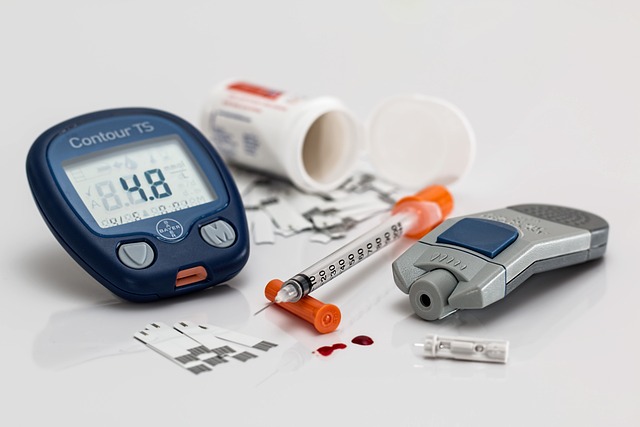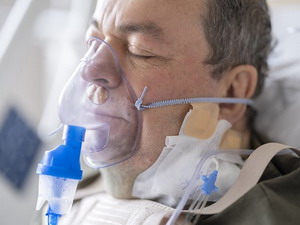 Last week I focused on the fundamental need for every cell in the body to have a good supply of oxygen-carrying blood. The oxygen is needed by the energy factories inside our cells (the mitochondria) to turn food (fats and sugars) into chemical energy (ATP). Today we are taking the next step and looking at the need for a constant supply of energy-providing molecules, typically in the form of the specific sugar glucose. Although most of your body can burn fats for energy, in the typical person most parts of the body prefer to run on glucose if it is available. Red blood cells and cancer cells are the two types of cells that do not use oxygen to produce the energy they need as the first has no mitochondria and in the second the mitochondria are damaged. Their energy comes from an oxygen-free breakdown of glucose sugar called anaerobic glycolysis.
Last week I focused on the fundamental need for every cell in the body to have a good supply of oxygen-carrying blood. The oxygen is needed by the energy factories inside our cells (the mitochondria) to turn food (fats and sugars) into chemical energy (ATP). Today we are taking the next step and looking at the need for a constant supply of energy-providing molecules, typically in the form of the specific sugar glucose. Although most of your body can burn fats for energy, in the typical person most parts of the body prefer to run on glucose if it is available. Red blood cells and cancer cells are the two types of cells that do not use oxygen to produce the energy they need as the first has no mitochondria and in the second the mitochondria are damaged. Their energy comes from an oxygen-free breakdown of glucose sugar called anaerobic glycolysis.
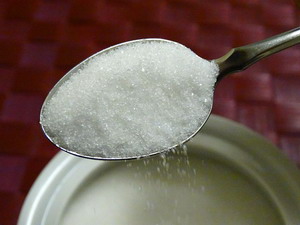 So unless you are on a keto diet like me, your body is most likely burning sugar for energy. Other than your liver and muscles, which can store excess sugar as glycogen for energy later, most of your cells exist on an on-demand basis for energy. If a steady supply of sugar is not available at all times, cells in your body can not work right. This manifests clinically as too much sugar in your blood and too little sugar in your blood. While these sound like opposite situations, they are actually the same problem for the cells. There is not enough sugar to make energy. With hyperglycemia (too much sugar) the sugar is piling up in the blood because it can not get into the cells where it is needed. This is because the doorkeepers to the cells have stopped listening to the signals telling them to open up and let sugar in. The signal comes from the hormone insulin formed in the pancreas. This is known as insulin resistance. And when it becomes bad enough, we call it type 2 diabetes.
So unless you are on a keto diet like me, your body is most likely burning sugar for energy. Other than your liver and muscles, which can store excess sugar as glycogen for energy later, most of your cells exist on an on-demand basis for energy. If a steady supply of sugar is not available at all times, cells in your body can not work right. This manifests clinically as too much sugar in your blood and too little sugar in your blood. While these sound like opposite situations, they are actually the same problem for the cells. There is not enough sugar to make energy. With hyperglycemia (too much sugar) the sugar is piling up in the blood because it can not get into the cells where it is needed. This is because the doorkeepers to the cells have stopped listening to the signals telling them to open up and let sugar in. The signal comes from the hormone insulin formed in the pancreas. This is known as insulin resistance. And when it becomes bad enough, we call it type 2 diabetes.
 The alternate situation is called hypoglycemia (low blood sugar). Normally, the sugar levels in your blood are regulated by your liver. When your levels get low, your liver converts some of its stored glycogen back into glucose to raise your blood sugar levels. If still more is needed then the liver starts making sugar by breaking down certain amino acids from protein. This blood sugar imbalance might be from a liver problem itself, or the cells might be overly sensitive to insulin and grab too much sugar from the blood thus lowering the blood sugar level too much. A third and obvious reason for low blood sugar is when you are using up your sugar too rapidly. We see this with long-distance runners. During a marathon run, there is a classic point when runners say they boink. This is when they run out of blood sugar to keep their muscles going. They try to avoid this by sucking on nasty-tasting glucose syrup packets while they run in order to keep their blood sugar levels stable. They can also avoid this by converting their muscles over to burning fats for energy. The body stores enough fat to survive for weeks to months. This tactic is used by ultra-long bicycle racers to keep their energy up for those 200-mile cycle runs.
The alternate situation is called hypoglycemia (low blood sugar). Normally, the sugar levels in your blood are regulated by your liver. When your levels get low, your liver converts some of its stored glycogen back into glucose to raise your blood sugar levels. If still more is needed then the liver starts making sugar by breaking down certain amino acids from protein. This blood sugar imbalance might be from a liver problem itself, or the cells might be overly sensitive to insulin and grab too much sugar from the blood thus lowering the blood sugar level too much. A third and obvious reason for low blood sugar is when you are using up your sugar too rapidly. We see this with long-distance runners. During a marathon run, there is a classic point when runners say they boink. This is when they run out of blood sugar to keep their muscles going. They try to avoid this by sucking on nasty-tasting glucose syrup packets while they run in order to keep their blood sugar levels stable. They can also avoid this by converting their muscles over to burning fats for energy. The body stores enough fat to survive for weeks to months. This tactic is used by ultra-long bicycle racers to keep their energy up for those 200-mile cycle runs.
So what kind of clinical symptom questions do we use to screen for blood sugar issues? Circle your answers below and add up the 2’s and 3’s to get your score.
0 means the least/or never increasing up to 3 means most/or always
Blood Sugar Fluctuation
 Do you get irritable if meals are missed? 0 1 2 3
Do you get irritable if meals are missed? 0 1 2 3
Do you feel energized after eating? 0 1 2 3
Does your energy level drop in the afternoon? 0 1 2 3
Do you crave sugar and sweets in the afternoon? 0 1 2 3
Do you wake up in the middle of the night? 0 1 2 3
Do you have poor memory? Are you forgetful? 0 1 2 3
Do you depend on coffee to keep yourself going? 0 1 2 3
Score _______
Insulin Resistance
Do you get fatigued after meals? 0 1 2 3
Do you crave sugar and sweets after meals? 0 1 2 3
Do you feel you need coffee/tea after meals? 0 1 2 3
Do you have difficulty losing weight? 0 1 2 3
Is your waist girth equal to or larger than your hip girth? 0 1 2 3
Do you have frequent urination? 0 1 2 3
Has your thirst and appetite been increased? 0 1 2 3
Do you still have sugar cravings after eating sweets? 0 1 2 3
Do you have weight gain when under stress? 0 1 2 3
Do you have difficulty falling asleep? 0 1 2 3
A score of 6 or more in either category means this may be a problem for you.
 So what do we do about blood sugar problems? I am not allowed to work on such problems once diabetes has officially been diagnosed, but I do refer people to the work done by Dr Jason Fung; a kidney specialist from Toronto. He has a protocol for reversing diabetes that is getting about an 80% success rate. Check him out on YouTube. However, if you have not gotten to the disease state of diabetes, I have my own process for bringing things back in line. I look at three different forms of blood sugar control regulation problems. Diet is part of the solution, but so is brain control through both the nervous and hormonal systems. Various feedback loops in these systems have gotten scrambled, much the same as such loops that I work on to balance your muscles and bones. I use specific nerve and acupuncture point stimulation to reset these feedback loops and then set you on a diet to de-stress your blood sugar control system for a few weeks.
So what do we do about blood sugar problems? I am not allowed to work on such problems once diabetes has officially been diagnosed, but I do refer people to the work done by Dr Jason Fung; a kidney specialist from Toronto. He has a protocol for reversing diabetes that is getting about an 80% success rate. Check him out on YouTube. However, if you have not gotten to the disease state of diabetes, I have my own process for bringing things back in line. I look at three different forms of blood sugar control regulation problems. Diet is part of the solution, but so is brain control through both the nervous and hormonal systems. Various feedback loops in these systems have gotten scrambled, much the same as such loops that I work on to balance your muscles and bones. I use specific nerve and acupuncture point stimulation to reset these feedback loops and then set you on a diet to de-stress your blood sugar control system for a few weeks.
 The diet I use includes protein foods, non-starchy vegetables, fresh whole low-sugar fruits, and non-inflammatory fats. All grains, legumes, tubers, tropical fruits, and other obvious high-sugar sources should be avoided for at least three weeks. Also, no alcohol is allowed. We then slowly add in carb foods a bit at a time until we find your tolerance level. If you want to achieve this on your own then simply go full tilt onto a keto diet for a few months. Some of the best results seem to come from a Mediterranean Keto diet, which emphasizes mono-saturated fats like olive and avocado, high omega-3 fish or grass-raised and finished meats, and lots of low-carb veggies like salad greens. The only fruits that would be allowed here would be fresh berries in limited quantities. Blood tests can tell us how well you are progressing. The best test is a fasting insulin test. You are looking for your fasting insulin levels to be under 5.
The diet I use includes protein foods, non-starchy vegetables, fresh whole low-sugar fruits, and non-inflammatory fats. All grains, legumes, tubers, tropical fruits, and other obvious high-sugar sources should be avoided for at least three weeks. Also, no alcohol is allowed. We then slowly add in carb foods a bit at a time until we find your tolerance level. If you want to achieve this on your own then simply go full tilt onto a keto diet for a few months. Some of the best results seem to come from a Mediterranean Keto diet, which emphasizes mono-saturated fats like olive and avocado, high omega-3 fish or grass-raised and finished meats, and lots of low-carb veggies like salad greens. The only fruits that would be allowed here would be fresh berries in limited quantities. Blood tests can tell us how well you are progressing. The best test is a fasting insulin test. You are looking for your fasting insulin levels to be under 5.
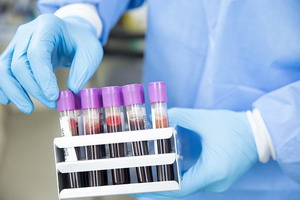 This topic is a lot more complicated than I am writing about here, but this information can get you well on your way. Your medical doctor can give you a blood test to tell you if you are pre-diabetic or diabetic. A sugar challenge test is needed to test for hypoglycemia. These are well within the medical wheelhouse. Usually, there are natural answers to these issues.
This topic is a lot more complicated than I am writing about here, but this information can get you well on your way. Your medical doctor can give you a blood test to tell you if you are pre-diabetic or diabetic. A sugar challenge test is needed to test for hypoglycemia. These are well within the medical wheelhouse. Usually, there are natural answers to these issues.
Take care,
David
Ellen
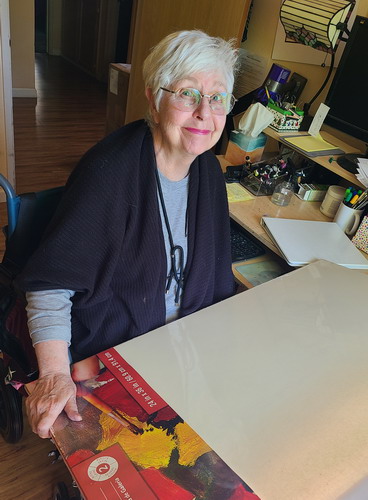 Probably 20 years ago I bought Ellen a three-pack of large canvases for her to experiment painting on. She was used to painting with a knife on a board, and a canvas would mean learning brush skills with her oil painting. Well she asked me yesterday to pull out one of those canvases that have been waiting these past 20 years. She loves collage and is thinking she can use the large format to do a collage piece. But more likely she will invent something entirely new.
Probably 20 years ago I bought Ellen a three-pack of large canvases for her to experiment painting on. She was used to painting with a knife on a board, and a canvas would mean learning brush skills with her oil painting. Well she asked me yesterday to pull out one of those canvases that have been waiting these past 20 years. She loves collage and is thinking she can use the large format to do a collage piece. But more likely she will invent something entirely new.
___________________________________________________________
Walking for back pain
 A recent study of 700 adults with low back pain showed that engaging in an almost daily walking plan for 30 minutes went around 8 months before another flareup compared to only 3 months for those who did not walk.
A recent study of 700 adults with low back pain showed that engaging in an almost daily walking plan for 30 minutes went around 8 months before another flareup compared to only 3 months for those who did not walk.
___________________________
“Self-pity is our worst enemy and if we yield to it, we can never do anything wise in this world.”
~Helen Keller
_____________________________________
Intermittent fasting facts
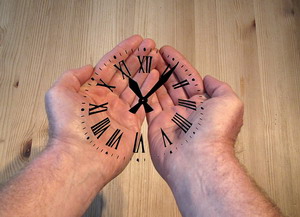 Intermittent fasting has become very popular for weight loss and health improvement. Quite a number of studies have now been done on this protocol. This article easily addresses the real kinds of results and dispels many of the myths that have evolved.
Intermittent fasting has become very popular for weight loss and health improvement. Quite a number of studies have now been done on this protocol. This article easily addresses the real kinds of results and dispels many of the myths that have evolved.
____________________________
“True happiness… is not attained through self-gratification, but through fidelity to a worthy purpose.”
~Helen Keller
________________________________________
Diabetes responds better to 5:2 diet than drugs
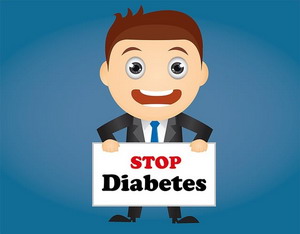 Reducing your consumption to only 500 calories for 2 days a week has been found to reduce blood sugar levels measured by HbA1c testing of long term sugar levels better than the metformin or empagliflozin most early diabetics are put on.
Reducing your consumption to only 500 calories for 2 days a week has been found to reduce blood sugar levels measured by HbA1c testing of long term sugar levels better than the metformin or empagliflozin most early diabetics are put on.
________________________
“What we have once enjoyed we can never lose. All that we love deeply becomes a part of us.”
~Helen Keller
